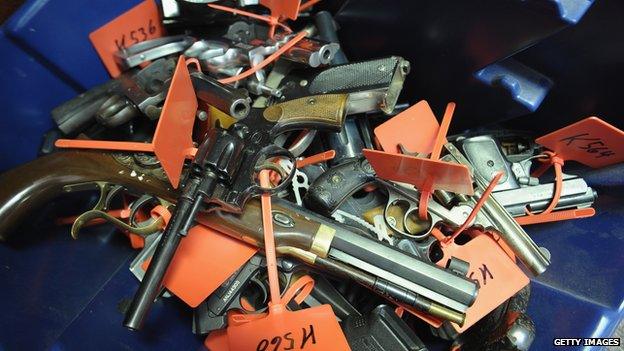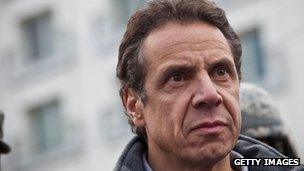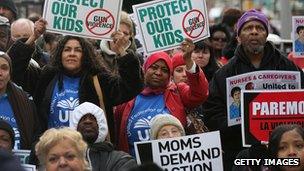Will gun laws hurt the mentally ill?
- Published

States have implemented various methods to keep guns off the street, like this gun buyback in New Jersey
New York is in the process of introducing some of the toughest gun laws in the US, but in one crucial aspect might they do more harm than good? Paul Adams reports on the consequences of mental health laws.
When Governor Andrew Cuomo put his name to the Secure Ammunition and Firearms Enforcement (Safe) Act, just a month after the mass shooting at Newtown, Connecticut, he told supporters that the bill's mental health provisions lay at the core of the legislation.
The act includes, among its various controls on gun ownership, something called a "mental health alert", which requires mental health professionals to report patients who they believe pose a threat to themselves or others.
"People who are mentally ill should not have access to guns," Gov Cuomo said. "That's common sense."
Hard to argue with that. Mental illness has clearly been at the centre of some of the country's most notorious mass shootings. But could the new law have an unintended consequence: making it harder for the mentally ill to seek help?

Governor Cuomo signed the Secure Ammunition and Firearms Enforcement Act into law shortly after the Newtown shootings
Anneliese, a native of Westchester county who agreed to speak to the BBC on condition of anonymity, has battled mental illness since she was a teenager. She never thought about doing harm to anyone, except herself. She's conquered her demons for now, but says the new law would have made it hard to seek help in the first place.
"If I was in the condition I was in when I was first diagnosed, I might not have gone back to treatment," she says.
The key to successful treatment, for Anneliese, was a relationship of trust with her therapist. Anything that threatened that relationship might have undermined the whole exercise.
"If I had that fear that it would go to the police, I would feel violated," she says. "Like big brother is watching me."
Mental health professionals and advocates fear that as a result of the new law, those who need treatment will stay away from the very people who ought to be able to help them.
"It has set back stigma a trillion years," says Sharon McCarthy, programme director for the Westchester branch of the National Alliance on Mental Illness.
"In developing this law, you brought in the mentally ill people," says Ms McCarthy, whose daughter is bipolar. "You didn't bring in the gangs. You pinpointed that group."
42-year-old Michael Andersson from the Bronx believes society needs to be educated about how rarely mentally ill people commit violent acts against others.
Mr Andersson, who now supports others with mental illness, has previously been diagnosed with bipolar disorder and post-traumatic stress disorder. In the early stages of his illness, he had thoughts of harming himself.
"It feels horrible, really horrible when you hear people equating guns with the mentally ill," he says. "But people will start doing it because it's now in the language of this legislation."
Gov Cuomo's office failed to return several BBC calls seeking guidance on the new regulations. Those who will find themselves legally obliged to follow the Safe Act's provisions say they're still in the dark.
"We've received no guidance," says Professor Paul Applebaum, director of law, ethics and psychiatry at Columbia University.
"We've been asking for it," he says. "Should no guidance arrive, we will have to come up with our own ad hoc rules."
Like others in the field of mental health, Prof Applebaum fears that patients, who already do their utmost to maintain their anonymity, will recoil at the new regulations.
"Lots of people, because of the stigma associated with mental illness, don't want anybody to know that they're in treatment," he says.
"They don't use their insurance coverage. They pay out of pocket, so their employer and their insurer won't know. They may not even tell their spouse."
The thought that their doctor might now report them to a local official, he says, could be disastrous.
"It may be enough to scare them away forever."
But the Safe Act has plenty of supporters.
Westchester County's Board of Legislators passed a resolution urging similar action by federal leaders.
The board's chairman, Ken Jenkins, says the act has adequate protections and that no-one should fear that the mental health provision will be used for anything other than preventing the sale of handguns and assault-style weapons to those who have been reported.
He says it's only reasonable that gun ownership now comes with an extra burden.
"For the privilege of having... specific types of guns, you now have the additional responsibility for opening up your privacy," he says.
Leah Gunn Barrett, executive director of New Yorkers Against Gun Violence, whose older brother was murdered in Tulsa, Oklahoma in 1997, says it's too early to pass judgement on the Safe Act's mental health alert.
Practical details can be ironed out between government officials and the mental health community, says Ms Barrett, who was on the podium when Gov Cuomo signed the bill in January.
"Whenever a ground-breaking law is passed, not everything is perfect at the outset," she says. "The intent is to protect New Yorkers from gun violence."
But those who live with the consequences of mental illness every day suspect that a vulnerable community is being singled out to assuage the sort of fears memorably expressed by the National Rifle Association's executive vice president, Wayne LaPierre, last December.

Protesters in New York this month want to see laws like the Safe Act adopted by federal government
"The truth is that our society is populated by an unknown number of genuine monsters," Mr LaPierre said, in the NRA's first reaction to the Sandy Hook killings.
"People that are so deranged, so evil, so possessed by voices and driven by demons, that no sane person can ever possibly comprehend them."
Talk like that makes Anna-Christina Allen's blood boil. Her two sons, Shawn and Billy, both suffer from mental illness. Shawn, the oldest, is sometimes violent. Anna doesn't want him anywhere near a gun, but says the new law is driven by fear and ignorance.
"Let's blame the weakest part of society," she says, with barely concealed anger.
The mentally ill, she says, are more often victims of violence, not the perpetrators. Research has shown that mental illness is associated with an extremely small proportion of violent crime in America (as little as 4.3%, according to one 2003 study).
"They're the ones that society pushes down and kicks," says Ms Allen. "Over and over again."
Barack Obama has said that it should be as easy, in the future, to gain access to mental healthcare as it is, now, to buy a gun.
In New York, some people are worried that it's about to get a little harder.
- Published18 December 2012
- Published11 February 2013
- Published16 January 2013